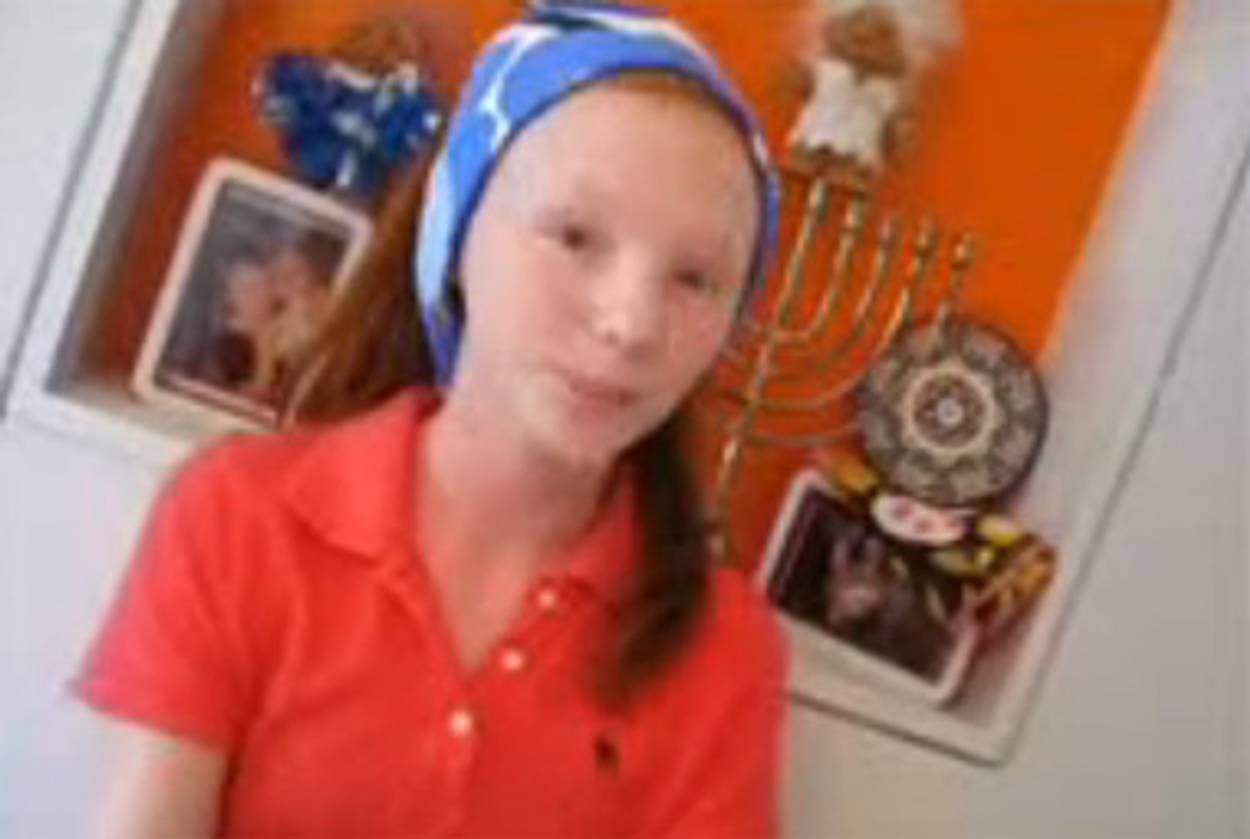God Is in the Details
What a parody bat mitzvah speech tells us about real ones




A little red-haired girl with a chic babushka (Marimekko?) practices reading her bat mitzvah speech into a camera held by her doting dad. She tells the camera that fashion is part of her heritage as a Jew (“History tells us that as far back as Arnold Scaasi … ”) and that the People of the Book are also known as The People of the Cloth. She compares the judgment of Yom Kippur to the judgment in the fashion tents; discusses her Mitzvah Project helping prisoners dress for parole hearings (intercut with a photo of Martha Stewart in an orange jumpsuit); and compares the suffering of Abraham as he’s told to sacrifice Isaac to her own suffering while waiting on line at H&M, “and also getting into cigarette jeans.” Soon the Jews of Facebook were jabbering about the video. Many were horrified. What a spoiled girl! What terrible values her parents had! Fashion Week is not a High Holiday!
But others got that it was a joke. (If the girl’s dachshund were really named “Miuccia,” wouldn’t she be able to pronounce it?) “Fashion Week High Holidays Bat Mitzvah Speech Practice By Hannah” is not a real Bat Mitzvah speech. It’s a comic piece by writer Bob Morris, a style writer, frequent contributor to The New York Times and author of Assisted Loving, a memoir about double-dating with his elderly father. Hannah is played by his tennis partner’s daughter. Miuccia is played by his dog, Zoloft.
“My intent was more about satirizing fashion culture than religion,” he tells me. What was the genesis of the piece? “Last year, the first day of Fashion Week was on the first day of Rosh Hashanah, and I was doing a column at the New York Observer at the time. I had to dress carefully because I was going from a fashion show to services. And when you’re standing around with a bunch of Jews two minutes from the Garment District, you’re gonna check out each other’s outfits!”
Morris comes from a Conservative Jewish background. “My oldest memories of long days of High Holiday services on Long Island always were mixed with memories of women dressing for each other,” he says. “We had style, judgment, and atonement all under one roof.” Writing the script for the video took him several days and multiple rewrites. To prepare, he watched dozens of b’nai mitzvot speeches on YouTube.
“They all follow the same template,” he says. “Welcome the congregation, talk about becoming a man or a woman, discuss their portion, throw in a pitch for their community services, thank everyone.” Even though Morris’s primary intention was to parody fashion culture, the speeches were a target, too. “You have parents throwing their kids into religious training that has no fallout whatsoever when it’s over,” he points out. “It warrants social commentary.”
I think the video is hilarious, but I also think it could be a great opportunity for families and religious leaders to talk about what a bar or bat mitzvah speech is supposed to be. Isn’t Hannah’s speech, fake as it is, a better model than the typical “Myyyyy poooortion … ,” full of stale, shallow insights that came from the rabbi or mom rather than the kid? Shouldn’t the d’var Torah reflect a kid’s actual interests, attempting to relate the kid’s daily life to the coming-of-age ceremony?
Besides, Hannah isn’t way off base about the transformative power of beauty in our culture. (The Jewish one, not the one in the tents.) “Hiddur mitzvah” is the principle of enhancing a mitzvah through aesthetics, so Hannah is right about the beauty of the jewel-toned synagogue windows and the “white Victorian lace dollies” (to which her “father” barks “DOILIES!”) on lady’s heads. Her love of fashion could be an awfully good jumping-off point for a discussion of why we often judge people by the cut of their Carolina Herrera rather than the content of their character. One could even encourage a discussion of heavenly judgment.
There’s a notion … and not the kind you buy at M&J Trimming on Sixth Avenue.
Marjorie Ingall is a former columnist for Tablet, the author of Mamaleh Knows Best, and a frequent contributor to the New York Times Book Review.